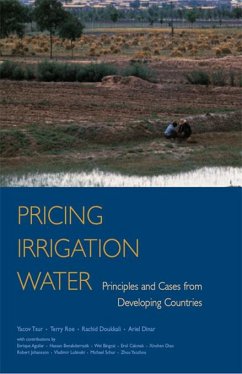As globalization links economies, the value of a country's irrigation water becomes increasingly sensitive to competitive forces in world markets. Water policy at the national and regional levels will need to accommodate these forces or water is likely to become undervalued. The inefficient use of this resource will lessen a country's comparative advantage in world markets and slow its transition to higher incomes, particularly in rural households. While professionals widely agree on what constitutes sound water resource management, they have not yet reached a consensus on the best ways of implementing policies. Policymakers have considered pricing water - a debated intervention - in many variations. Setting the price 'right,' some say, may guide different types of users in efficient water use by sending a signal about the value of this resource. Aside from efficiency, itself an important policy objective, equity, accessibility, and implementation costs associated with the right pricing must be considered. Focusing on the examples of China, Mexico, Morocco, South Africa, and Turkey, Pricing Irrigation Water provides a clear methodology for studying farm-level demand for irrigation water. This book is the first to link the macroeconomics of policies affecting trade to the microeconomics of water demand for irrigation and, in the case of Morocco, to link these forces to the creation of a water user-rights market. This type of market reform, the contributors argue, will result in growing economic benefits to both rural and urban households.
Dieser Download kann aus rechtlichen Gründen nur mit Rechnungsadresse in A, B, BG, CY, CZ, D, DK, EW, E, FIN, F, GR, HR, H, IRL, I, LT, L, LR, M, NL, PL, P, R, S, SLO, SK ausgeliefert werden.

